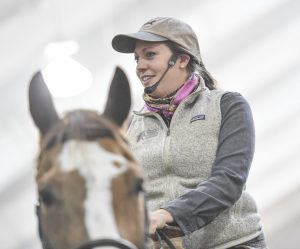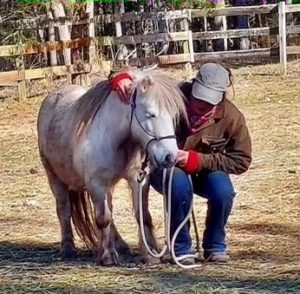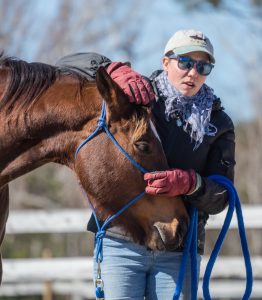
Skinner at the Best Horse Practices Summit
Editor’s Note: Amy Skinner is a regular guest columnist and has been a horse gal since age six. She has presented twice at the Best Horse Practices Summit and is the author of To Catch a Horse: Finding the Heart of your Horsemanship.
She rides and teaches dressage and Western. Skinner has studied at the Royal Andalusian School of Equestrian Art in Spain, with Brent Graef, Leslie Desmond, and many others. Visit her website here.
Amy Skinner writes:
The relationships we have with our horses often painfully reflect the rest of our lives. Whether we avoid conflict or seek it out, whether we are too passive or too aggressive, or whether we fluctuate between the two. It tends to shed light on the good, bad, and the ugly in a way that can be very uncomfortable. One thing that I’ve learned about people throughout my time as a teacher, is that people try to avoid discomfort, and therefore become committed to their regular and routine dysfunction.
This is why horse training, which is also human training, is so tricky. People have subconscious ways of sabotaging the horses’ progress when it gets into territory they aren’t familiar with. Even when their regular interactions with their horses are unpleasant, stressful, or even dangerous. Better The Devil You Know Than The Devil You Don’t.
 The discomfort of feeling out of their element, learning to behave in new and different ways, or accept personal responsibility for the dysfunction, can be too great for some to bear. It’s much easier to work on learning nifty new different training methods, new tricks, rather than pursuing the deep personal change.
The discomfort of feeling out of their element, learning to behave in new and different ways, or accept personal responsibility for the dysfunction, can be too great for some to bear. It’s much easier to work on learning nifty new different training methods, new tricks, rather than pursuing the deep personal change.
I’ve often noticed the phenomenon of getting to this heart of the matter when I work with a problem horse without the owner. Things are looking up. The horse is becoming more confident and peaceful. Yet now the client actually becomes less satisfied.
I’ve had clients create contention over seemingly minor issues that didn’t exist before and end up taking their horses home. I’ve had clients sneak back to their old habits when they think I’m not watching, like feeding treats to the nippy horse, while resentfully commenting: “It’s my horse and I’ll do what I please.”
These people are not bad people. They’re wonderful people who came to get help and love their horses. But I think it’s an important discussion to have. If we don’t recognize this disconnect between trying to get to a better place while staying comfortable with dysfunction, we can’t help our horses.

Amy Skinner works with a young horse
The ego is a nasty thing. Eckhart Tolle, author and mindfulness teacher, describes the ego as a living entity. I like thinking of it as alive because it helps me understand how otherwise good people can lash out, retreat, or return to dysfunction with so much devotion.
The ego wants to live and is being confronted. Having a light shined on it threatens its very existence. It has a sneaky little way of keeping itself strong. If we aren’t aware and open, we may not even realize the cycle of ego keeping us in our bad, unhelpful ways.
This is what I think Ray Hunt meant when he said: “When I see your horse, I see you too.” Horses are such amazing teachers because they really show us what’s inside of us and offer the unique opportunity to make real changes in our lives.
Right on. Horses are a doorway to an expanded awareness humans don’t usually experience. We are so wrapped up in “humanism” we tend to judge, or seek to control, rather than observe and understand. We try to bend our environment to suit ourselves, rather than just see it for what it is. However, when we let go of those unproductive human tendencies, horses can take us amazing places within our own lives. I have said you can know more about a person by observing their horse, than vice versa; I hadn’t known Ray Hunt said the same thing. Glad to see I’m on the right track. Bet my horse is glad, too!
Love bringing this to light Amy. So well said with truth and compassion.
Oh, this is lovely Amy!
Except when it makes me change my dysfunction LOL